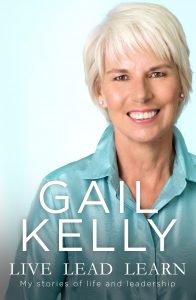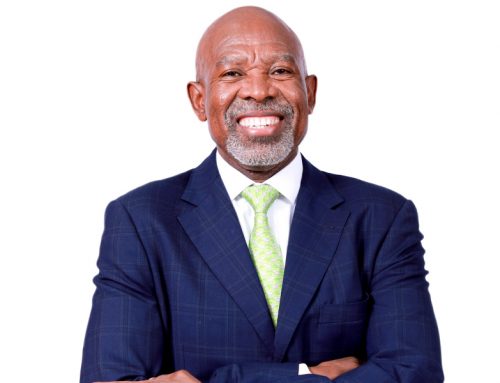 “Let me sit closer to you,” says Wits Business School MBA alumna Gail Kelly as we position ourselves around the imposing table in the VIP dining room at Wits Business School. This is the woman Forbes listed in 2010 as the eighth most powerful woman in the world; the first female CEO of Westpac, one of Australia’s big four banks, which she led from 2008 to 2015, and where women now occupy half of all management positions.
“Let me sit closer to you,” says Wits Business School MBA alumna Gail Kelly as we position ourselves around the imposing table in the VIP dining room at Wits Business School. This is the woman Forbes listed in 2010 as the eighth most powerful woman in the world; the first female CEO of Westpac, one of Australia’s big four banks, which she led from 2008 to 2015, and where women now occupy half of all management positions.
Gail has lived in Australia for 21 years, yet her heart is still in South Africa, where she grew up and started her banking career in 1980 as a teller at the Simmonds Street branch of the ‘SA Perm’ or South African Permanent Building Society in Joburg, which subsequently merged with Nedbank.
She was “eager and hardworking”, she says, and quickly rose through the ranks of the Nedbank Group. During this time she did her MBA at Wits Business School, graduating with distinction in 1986, while pregnant.
In her new book Live Lead Learn: My Stories of Life and Leadership she writes that when she started the MBA, she was intimidated by the mostly engineers, chartered accountants, mathematicians and doctors in the group.
“Yet when it came to the cut and thrust of things, I found that I could write clearly and concisely and could argue the merits of a case. I could look at a complex situation from many points of view, getting to grips with the details while also standing back and thinking strategically about the whole.”
Her thesis was all about how CEO success depends on the development and advancement of employees who show potential. In her case it was prophetic. In 1990 she was made group general manager of human resources at Nedbank, and later head of the card and personal banking divisions.
Give it a go
She and her family moved to Australia in 1997. Gail was 40 at the time and she pioneered a path for women in banking there. She says it helped that it was the right time and the right place, as it was a time of growth when Australia was looking for senior women executive bankers. She was interviewed by a range of banks and received five offers in one week.
Rising to the challenge she adds that there were many occasions when she felt fear and wondered whether she was up to the responsibility she had taken on. “What I learnt is that you have to stare down the fear of failure. You owe it to yourself to give it a go.” She drew on this many times as CEO of Westpac, which she describes as “by far the most demanding role of my executive career.”
Since retiring in 2015 she has joined the board of Woolworths in South Africa; the group expanded to Australia about three years ago. She also recently established the Gail Kelly Global Leaders Scholarship between the University of Cape Town, where she studied as an undergraduate, and the University of New South Wales where she is an Adjunct Professor.
“I frequently come back to South Africa, partly for work but also because Kruger National Park and the South African bush is in my DNA. However, this is the first time I have been back on the Wits Business School campus in about 20 years. It’s wonderful to be back and to see all the growth and development, and to be in South Africa during this huge moment of change.
“I was last here in November 2017 when my book was first launched and it struck me how uncertain everyone was about the future then. South Africans are generally so positive and tend to look at the upside, but people were deeply worried. Since the appointment of President Cyril Ramaphosa, there is so much more optimism, and while there is still uncertainty and there are going to be many bumps in the road, there is a feeling that South Africa is on a new and better path.
“Business has a key role to play in this: to work with the President to create jobs and improve the economy. Confidence builds confidence; it becomes a multiplier.”
Family and work
Gail credits her success to her education, to the banks that gave her an opportunity, to the strong foundation she received from her late parents Herby and Pat Currer, and to the unwavering support of her husband, Allan Kelly (MBBCh 1984), who initially qualified as a social worker at UCT and then as a doctor at Wits, specialising as a paediatrician. “He is a wonderful, generous spirited individual who has always wanted the best for me and supported me wholeheartedly.
“Whenever I would say to him ‘I’m not sure I can do this, what if I fail, what about the kids’, he would reply: ‘Have a go and we’ll work it out’. There is a massive amount of trust and communication between us and together we have worked things out, always making sure we focused on our family and children – our daughter Sharon and our triplets, Sean, Mark and Anne.
“Often when I travelled one of the children would come with me. We had no compunction about taking them out of school for short periods to gain the experience of seeing London or New York or Vienna or Johannesburg. It was precious one-on-one time and it helped them to better understand my work.”
In her book Gail talks about her parents, who were both from large, working class families with roots in England and Scotland. She was brought up in Pretoria and went to school at St Mary’s Diocesan School for Girls there. Her mother taught her to read and to stand on her own two feet and her father led by example on the importance of a positive attitude and self-belief. “It was wonderful to see how much joy and satisfaction he got out of even the most ordinary things. He exuded energy and took difficulties and challenges in his stride. Things that didn’t go to plan became learning opportunities.”
He died in 1980 – but she still recalls the encouraging words he gave her ahead of tennis matches, which became a life philosophy: “Just give it your best. Make sure you try. Relax. Relax your shoulders.”
Choose to back yourself
“As the years go by I all the more strongly believe that you have the opportunity as a human to choose your responses to situations, and to choose to be positive and to back yourself by digging deep inside yourself, asking for support where possible, and giving it a go no matter where you find yourself. Also to keep on learning from every situation and continually ask yourself what you can do differently.”
She followed this formula and became one of the world’s most renowned business leaders, and Forbes’ “eighth most powerful woman”, a positioning she finds more amusing than anything else, “especially since I was sandwiched between Lady Gaga and Beyoncé, to my daughters’ delight. I don’t pay any attention to this kind of thing and ‘powerful woman’ is not a description I use.”
But powerful she is in her own gracious way; she had to be to run a major bank. All the more so when it was her responsibility to lead Westpac through the 2008/9 global financial crash: “It was challenging and stressful but it was my job to cope, to keep a cool head and to play my role as the head of a very important organisation in the Australian economy and work with government, regulators and the CEOs of other banks, local and globally.”
Among her many roles is membership of the Group of Thirty, an international group of the most senior experts on economic and financial affairs.
What stands out about Gail is that she doesn’t cast a mirage of mystery around high finance, which many CEOs do. “Management is all about surrounding yourself with the best, the most talented and the most trustworthy, all the while reinforcing the imperative of integrity and doing the right thing. Do the right thing all the time, every time, including when no one is watching.”
Put customers first
“The most successful CEOs,” she says, “are strong communicators who take responsibility, recognise talent and empower people.” These CEOs put customers first, and align their companies’ goals and actions with their values.
Gail’s management style is direct and hands-on: “Having started out as a teller I have empathy, respect and admiration for what all the people in the frontline of the organisation contribute.”
She acknowledges that many companies and organisations make claims about their corporate culture but it’s only true when the staff and customers believe it and feel it. She is also a big advocate for flexibility in the workplace. At Westpac over 80% of staff are on a form of flexible work schedule, which assists staff with children to manage a career and family.
Flexibility and being in the moment
“Having a career and children is absolutely possible with the right support system,” she says. “A flexible system also helps to address the pressing need to get more women into senior management positions.”
She adds that for a working mother there is always a sense of “I wish I could do more”, coupled with a sense of regret and guilt. “I say to mums: don’t beat yourself up; you are doing your best, the child is fine. I had to learn this and I also had to learn to focus on what I was doing. If I was at a school event, I needed to focus on it instead of worrying about something at work. Being in the moment is extremely important. It applies to everything in life and if you can get this right it will serve you well.”




